Related Research Articles

Arcology, a portmanteau of "architecture" and "ecology", is a field of creating architectural design principles for very densely populated and ecologically low-impact human habitats.

The economy of the United Arab Emirates (UAE) is the 5th largest in the Middle East, with a gross domestic product (GDP) of US$503 billion in 2022.

Zoning is a method of urban planning in which a municipality or other tier of government divides land into areas called zones, each of which has a set of regulations for new development that differs from other zones. Zones may be defined for a single use, they may combine several compatible activities by use, or in the case of form-based zoning, the differing regulations may govern the density, size and shape of allowed buildings whatever their use. The planning rules for each zone determine whether planning permission for a given development may be granted. Zoning may specify a variety of outright and conditional uses of land. It may indicate the size and dimensions of lots that land may be subdivided into, or the form and scale of buildings. These guidelines are set in order to guide urban growth and development.
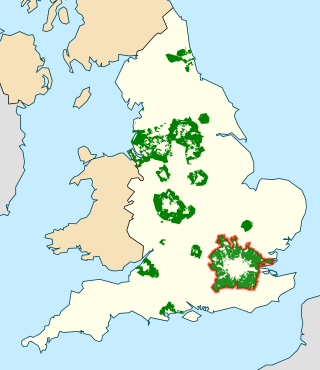
In British town planning, the green belt is a policy for controlling urban growth. The term, coined by Octavia Hill in 1875, refers to a ring of countryside where urbanisation will be resisted for the foreseeable future, maintaining an area where local food growing, forestry and outdoor leisure can be expected to prevail. The fundamental aim of green belt policy is to prevent urban sprawl by keeping land permanently green, and consequently the most important attribute of green belts is their openness.

Dubai International Airport is the primary international airport serving Dubai, United Arab Emirates, and is the world's busiest airport by international passenger traffic. It is also the nineteenth-busiest airport in the world by passenger traffic, one of the busiest cargo airports in the world, the busiest airport for Airbus A380 and Boeing 777 movements, and the airport with the highest average number of passengers per flight. In 2017, the airport handled 88 million passengers and 2.65 million tonnes of cargo and registered 409,493 aircraft movements.

Dubai is the most populous city in the United Arab Emirates (UAE) and the capital of the Emirate of Dubai, the most populated of the 7 emirates of the United Arab Emirates. Established in the 18th century as a small fishing village, the city grew rapidly in the early 21st century with a focus on tourism and luxury, having the second most five-star hotels in the world, and the tallest building in the world, the Burj Khalifa, which is 828 metres (2,717 ft) tall.

Dubailand was an entertainment complex planned to be built in Dubai, United Arab Emirates, which was owned by Tatweer. When announced in 2003 it was one of the most ambitious leisure developments ever proposed anywhere in the world costing $64.3 billion, but development has been severely impacted by global recession and Dubai's financial crisis. The development was put on hold in 2008 but resumed in mid-2013. Updates in 2013 showed that $55 billion had been raised towards the works.

The Houston Museum District is an association of 19 museums, galleries, cultural centers and community organizations located in Houston, Texas, dedicated to promoting art, science, history and culture.

Urban agriculture is the practice of cultivating, processing, and distributing food in or around urban areas. It is the growing of fresh produce within the city for individual, communal, or commercial purposes in cities in both developed and developing countries. The term also applies to urban area activities of animal husbandry, aquaculture, beekeeping, and horticulture. These activities occur in peri-urban areas as well, although peri-urban agriculture may have different characteristics.

Jebel Ali is a port town 35 kilometers (22 mi) south-west of Dubai. The Jebel Ali Port is located there. Al Maktoum International Airport has been constructed just outside the port area. Jebel Ali is connected to Dubai via the UAE Exchange, Danube and Energy stations on the Dubai Metro. Among the infrastructure projects built to support the port and town is the world's largest desalination plant, the Jebel Ali Desalination Plant, providing an ample supply of freshwater.
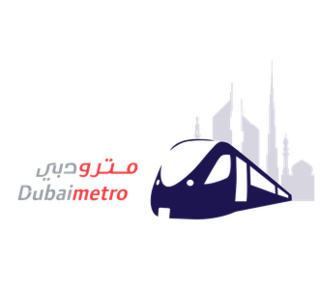
The Dubai Metro is a rapid transit rail network in the city of Dubai, United Arab Emirates. It is currently operated by a consortium of the French company, Keolis, and Japanese Company, MHI, as Keolis-MHI.
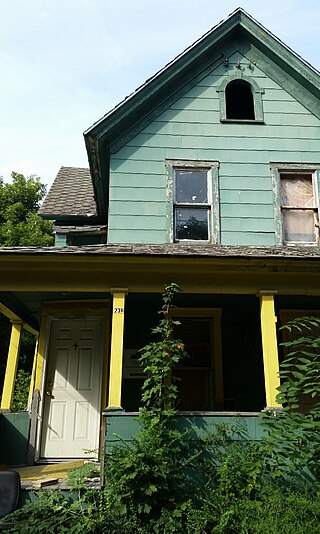
Land banking is the practice of aggregating parcels of land for future sale or development.

Mary Mattingly is an American visual artist living and working in New York City. She was born in Rockville, Connecticut in 1978. She has studied at Parsons School of Design in New York, and received her Bachelor of Fine Arts (BFA) from Pacific Northwest College of Art in Portland, Oregon in 2002. She is the recipient of a Yale University School of Art Fellowship, and was a resident at Eyebeam Art and Technology Center from 2011 to 2012.
The earliest written record of Dubai (Dibei) is accredited to Muhammad al-Idrisi, who mapped the coast of the UAE in the tenth century AD. Circa 1580, the state jeweler of Venice, Gasparo Balbi, documented the pearling industry of Dubai and other cities currently presiding in UAE territory. Though traditionally conservative, the UAE is one of the most liberal countries in the Gulf, with other cultures and beliefs generally tolerated. Politically it remains authoritarian, however, relations with neighbouring Iran have been tense because of an ongoing territorial dispute over Gulf islands. The UAE was one of only three countries to recognise Taliban rule in Afghanistan.
The Dubai government took a decision to diversify from a trade-based, oil-reliant economy to one that is service and tourism-oriented has made real estate and other developments more valuable, resulting in a property boom from 2004 to 2006. Construction on a large scale has turned Dubai into one of the fastest-growing cities in the world. There are a number of large-scale projects which are currently under construction or will be constructed in the future. Due to the heavy construction which is taking place in Dubai, 30,000 construction cranes, which are 25% of cranes worldwide, are operating in Dubai. Due to the burst of construction, Dubai has acquired various building-related records, which include: the world's tallest tower, the world's largest shopping mall, the world's largest fountain and the world's tallest hotel. Also under construction is Dubailand, which will be almost twice the size of the Walt Disney World Resort.

Abu Dhabi is the capital and second-most populous city of the United Arab Emirates, after Dubai.

Jebel Ali Village (JAV) is a neighbourhood in Jebel Ali, southern Dubai, United Arab Emirates. Now it is a redevelopment by Nakheel Properties of the existing Jebel Ali Village. Churches Complex of Jebel Ali is located here.
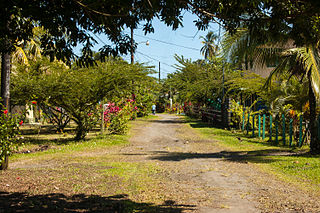
Green urbanism has been defined as the practice of creating communities beneficial to humans and the environment. According to Timothy Beatley, it is an attempt to shape more sustainable places, communities and lifestyles, and consume less of the world's resources. Urban areas are able to lay the groundwork of how environmentally integrated and sustainable city planning can both provide and improve environmental benefits on the local, national, and international levels. Green urbanism is interdisciplinary, combining the collaboration of landscape architects, engineers, urban planners, ecologists, transport planners, physicists, psychologists, sociologists, economists and other specialists in addition to architects and urban designers.
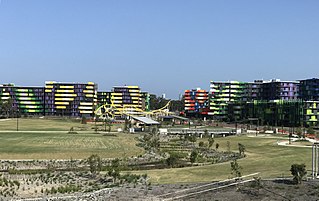
The 2018 Commonwealth Games Athletes Village was an accommodation centre to house all participating athletes, as well as officials and athletic trainers of the 2018 Commonwealth Games. It was located in Southport, Gold Coast.
References
- 1 2 "Food City, Dubai" (PDF). Metabolic Urbanism. Archived from the original (PDF) on 4 March 2016. Retrieved 22 March 2013.
- ↑ "Food City: Dubai's Self-Sufficient Ecotopia". 13 May 2009.
- ↑ "Dubai Plans Food City Project Worth $200m". Gulf News. Retrieved 14 May 2016.